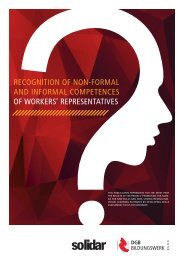The Albanian Fason Industry - Solidar
The Albanian Fason Industry - Solidar
The Albanian Fason Industry - Solidar
You also want an ePaper? Increase the reach of your titles
YUMPU automatically turns print PDFs into web optimized ePapers that Google loves.
ut do not fulfill the required years of service<br />
based on the law.<br />
As mentioned earlier, the economic crisis has<br />
directly impacted on the daily cost of living and<br />
reduced the opportunities for finding a decent<br />
job due to the following outcomes:<br />
• Overall reduction in the number of contracts<br />
• Contracts with less favourable conditions<br />
• Termination of existing contracts<br />
• Difficult prospects of signing new collective<br />
agreements<br />
In the Western Balkans the minimum wage<br />
represents a low percentage of the average<br />
income (Kohl, 2009, p.55) and in 2009 Albania<br />
had the lowest minimum wage in the region. <strong>The</strong><br />
research “Rapid Assessment of the impact of the<br />
global Economic crisis on the Apparel and<br />
Footwear <strong>Industry</strong> in Albania” claims that wages<br />
in the textile and footwear sector are among the<br />
lowest in Albania (ISB, 2010, p.46) and clearly<br />
insufficient to guarantee a decent life.<br />
Country<br />
Minimum wage in Euro<br />
Albania 138<br />
Bosnia-Herzegovina 159<br />
Croatia 381<br />
Macedonia -<br />
Montenegro -<br />
Serbia 159<br />
Table 2: Minimum Wages in the Western Balkans (Euros)<br />
Source: Friedrich Ebert Stiftung, 2009.<br />
Note: no statutory minimum wage in Macedonia and<br />
Montenegro<br />
This sector is heavily dependent on a cheap and<br />
low-skilled labour force. Trade unions have been<br />
hesitant to demand higher wages fearing capital<br />
flight to more cost effective locations 4 . On 12<br />
July 2011, the National Labour Council approved<br />
an increase in the minimum wage at the national<br />
level from 19,000 (€138) 5 to 20,000 Leke (€143) 6<br />
and the hourly overtime payment was raised to<br />
115 Leke (82 cent) 7 per hour. Trade unions<br />
believe that the government should raise the<br />
minimum wage to 22,000 Leke/month (€157) 8 .<br />
During the last meeting of the National Labour<br />
Council, the National Chamber of Manufacturers<br />
for Clothing and Shoes requested a change in<br />
the law on customs tariff levels, including a<br />
removal of the customs tariff of 10%. <strong>The</strong><br />
proposal was welcomed and approved. Such a<br />
fiscal relief could in fact provide a new<br />
opportunity for trade unions to negotiate a<br />
minimum wage for the sector.<br />
Finally, very few enterprises are inspected and<br />
checked by inspectors, despite numerous<br />
denunciations of trade unions to relevant state<br />
bodies such as the Labour Inspectorate. In<br />
addition, reports are not made public even in the<br />
case of well known breaches of the law on social<br />
protection.This is mainly due to the lack of<br />
capacity of the Labour Inspectorate and<br />
ambiguous legislation governing the functioning<br />
of the latter. For instance, the Inspectorate’s<br />
structure is based on 12 directorates in the<br />
regions but all lack the necessary equipment.<br />
Furthermore, up until now only one out of the 24<br />
planned local offices has been fully established.<br />
According to unions, the number of inspectors is<br />
very low considering the size of the area they<br />
cover and the number of factories that they need<br />
to supervise. In 2008, the total number of<br />
inspectors was 90 which is insufficient to<br />
adequately perform tasks in the 540 fason<br />
factories, even in comparison with other<br />
countries in the region. This shows that there is<br />
an urgent need to increase the human, physical<br />
and financial resources of the State Labour<br />
Inspectorate.<br />
4 <strong>The</strong>re are factors that could prevent capital flight even if<br />
wages would rise such as Albania’s geographical position<br />
that offers rapid turnover of orders reducing transportation<br />
costs, the preference agreements in place, tax reducing<br />
policies etc.<br />
5 Exchange rate at the time of publishing<br />
6 Exchange rate at the time of publishing<br />
7 Exchange rate at the time of publishing<br />
8 Exchange rate at the time of publishing<br />
5 | Decent Work: <strong>The</strong> <strong>Albanian</strong> <strong>Fason</strong> <strong>Industry</strong>
















